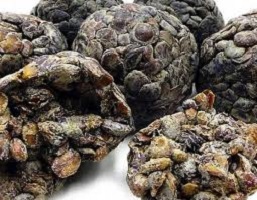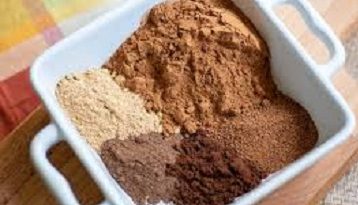Locust Beans Health Benefits of Locust Beans (Iru)
Health Benefits of Locust Beans (Iru)

In Nigeria and other West African countries, fermented locust beans are a popular traditional condiment. It is known as “iru” in Yoruba, “dawa dawa” in Hausa, and “ogiri okpe” in Igbo. In various parts of Africa, it is also called “sumbala,” “netetou,” and “kainda.”
It is also called the African locust bean and has the botanical name Parkia biglobosa. It is a popular soup ingredient all over the world.
Related hot topic RIGHT NOW!
It’s not pleasant to look at, and the smell is unpleasant.
Aside from these, Locust Bean is the single most important ingredient that will transform your soups, stews, or mixed vegetables from good to great.
Not only does it taste good and can be a healthier alternative to other spice cubes, but it also has health benefits such as vision improvement, digestion aid, and much more.
Overview of Locust Beans
Did you know that locust beans are a food species with regional and international importance?
It is not a common food item in some African societies, but rather a therapeutic food and a source of income.
It grows in a variety of environments throughout Africa and is primarily grown for its pods, which contain both sweet pulp and valuable seeds.
The most valuable parts of the locust bean are high in lipid (29%), protein (35%), and carbohydrate (16%), and are a good source of fat and calcium for rural residents.
The locust bean product should be powdered and packaged in various sizes in plastics for easy distribution.
What is Locust Beans
According to local research, locust bean promotes good vision and keeps hypertension and diseases like stroke and diabetes at bay. It also has tannins, which are astringent substances found in many plants.
Tannin-rich foods are frequently recommended for the treatment of diarrhea.
The carob used to make locust bean gum contains soluble fiber from the galactomannan family.
It, like other types of soluble fiber, has shown promise in terms of weight loss and blood sugar control.
The African locust bean tree has also been discovered to be miraculous.
For example, the pulverized bark of the tree is used in wound healing and as one of the ingredients in the treatment of leprosy.
In Cote d’Ivoire, the bark decoction is also used as a bath for fever and as a hot mouth wash to steam and relieve toothache.
The pulverized bark of the African locust bean tree, for example, is used in wound healing and is one of the ingredients used to treat leprosy.
What is the nutritional value of iru? Locust beans nutritional value
The most valued parts of the locust bean are high in lipid (29%), protein (35%), and carbohydrate (16%), and are a good source of fat and calcium for rural dwellers.
Locust bean products can be converted into powdery form and packaged into various sizes in plastics for easy distribution
Iru has a free radical decreasing ability and is an antioxidant for detoxifying the body since the fruit has a remarkable amount of polyphenols that account greatly for its anti-oxidizing properties.
The anti-oxidizing properties of the fruit extracts of iru are very comparable to that of ascorbic acid.
Benefits of Locust Beans
Both the fruits, leaves, seeds, nuts, pods and essential oils of the African locust beans are highly treasured.
it serves as a source of food, traditional medicine, and remedy for several ailments. The seeds, which are enclosed in the yellow pulp are the most vital and the most widely used part of this plant.
These seeds are usually converted into an aromatic spice known as iru, ogiri or dawadawa.
There are numerous benefits to eating locust beans, which are discussed further below. These are the amazing Iru (African locust bean) health benefits include:
- Antioxidant Capabilities
Iru has the ability to reduce free radicals and is an antioxidant for detoxifying the body because the fruit contains a significant amount of polyphenols, which accounts for much of its anti-oxidizing properties.
The anti-oxidant properties of iru fruit extracts are very similar to ascorbic acid.
- Respiratory Infection Treatment
To treat respiratory infections such as pneumonia, bronchitis, cold, cough, and fever, it can be infused or soaked in liquid.
The concoction must be consumed and gargled by the patient.
- High protein content
Given that most people cannot afford to consume an adequate amount of meat and fish protein, which are the primary sources of protein, it becomes critical to include other cheap protein sources to avoid protein deficiency.
According to the WHO, more and more African children and pregnant women are becoming protein deficient, resulting in stunted growth, poor development, and other complications.
It is important to note that locust beans are high in protein and can provide a reasonable portion of your daily protein requirement if used frequently in your meals.
- Improved Vision
Locust beans are estimated to contain 30% protein, 15% fat, 4% crude fiber, 2% ash, and 2% carbohydrates, according to proximate analysis (49 percent).
The appealing yellow color indicates a reasonable presence of phytochemicals and carotenoids; an important precursor for retinol (Vitamin A), implying that this ingredient may aid in vision improvement.
- Aids in the control of cholesterol levels:
According to studies, fermented beans have high levels of High-Density Lipoproteins (HDL) – the good cholesterol.
The study was conducted on animals, and it was discovered that it could keep cholesterol levels in the human body within healthy limits.
Aside from the edible portion of the plant, it has been reported that the crushed bark of the locust bean tree can aid in wound healing and is used in the treatment of leprosy.
The bark can also be used to treat fevers and relieve toothaches.
Others include:
- Wound Healing Properties
- Hypertension Treatment
- Dermatological Qualities
- Gastrointestinal Disorders Treatment
- Sharp vision
- It can be used to treat strokes.
- Lower your cholesterol levels
- Diarrhea Treatment
- Manage hypertension
- Aids in blood sugar control
- Enhance digestion
- Maintain a healthy weight
- Repair Wounds
- Fever Reduction
Spiritual benefits of locust beans ~ What are the benefits of Dawadawa?
The seeds, leaves, and bark of the African locust bean tree have been traditionally used in West African communities to treat a variety of medical conditions such as malaria, diabetes mellitus, infections, and inflammatory diseases.
Locust Beans and Fibroid
According to folklore, drinking locust bean water cures fibroids. These claims, however, are not supported by science.
The leaves contain procyanidin, which has been shown to lower blood pressure. They have a greater effect on diastolic blood pressure than on systolic blood pressure.
Locust Beans and Fertility ~ Is locust beans good for fertility?
Locust beans contain zinc, which has been shown in studies to increase testosterone levels.
This mineral has also been shown in studies to increase the potency and frequency of sexual intercourse.
Another reason to include locust beans in your diet is to strengthen your immune system.
Benefits of locust beans for pregnant women
Locust beans are high in nutrients, particularly folate. Folic acid aids in the prevention of neural tube defects in unborn babies. Pregnancy should not prevent you from enjoying iru; in fact, pregnant women are advised to eat a lot of locust beans.
Why African Locust Bean Is Remedy for Diabetes, Heart Disease Treatment – Study
Currently, in a new study, researchers observed that the African locust bean (Parkia biglobosa) significantly lowered fasting blood sugar, total cholesterol, and triglyceride but increased HDL cholesterol significantly.
Specifically, they stated that diabetic patients should consume more African locust beans to reduce their blood sugar levels as well as even non-diabetic individuals for the prevention of diabetes and other coronary heart diseases.
Side Effects of Locust Beans
There have been no reported adverse effects from locust beans.
It is a completely healthy food that should be included in all meals. Nothing to be concerned about.
However, I advocate moderation.
Conclusion
The African locust bean, as it is commonly known by whites, has also been discovered to have numerous benefits that have helped improve people’s health for centuries.
It only surprises me that this fermented condiment has been banished from the elites’ kitchens and replaced with less or no nutritious ingredients.
Furthermore, some uninformed people believe that locust bean is only added to stews to improve the taste
They did not know that it can help in the prevention of many debilitating diseases, as science has proven its nutritional and health properties.
Finally, don’t forget to include Locust beans in all of your soups and stews not only because they taste good and can be a healthier alternative to other condiments, but also because they are packed with numerous health benefits.
Note: When incorporating locust beans (Iru) into your meals, keep an eye on the amount of table salt you use, as some salt has already been added to some Iru varieties to preserve them.
FAQs
What does the locust bean look like?
The pods of the tree, referred to as locust beans, are pink in the beginning and later turn dark brown when fully mature.
They are 30-40 centimeters long on average, with some reaching lengths of about 45 centimeters.
Every single pod can comprise up to 30 seeds; the seeds are embedded in a sweet, powdery yellow pulp.
What do locust beans do in the body?
The local study has shown that locust bean helps to stimulate good sight and drives away hypertension and disease conditions like diabetes and stroke.
It also contains tannins, astringent substances found in many plants. Foods rich in tannins are often recommended for the treatment of diarrhea
Is Dawadawa the same as locust beans?
Dawadawa is a flavoring made from the seeds of Parkia biglobosa, also called the African locust bean tree.
This deciduous, wide-spreading plant can reach up to twenty meters in height and is a member of the Fabaceae family.
Is locust beans the same as ogiri?
Ogiri (Locust bean), normally referred to as iru by Yorubas, and ‘dawadawa’ by Hausas, is a local seasoning or condiment used in making soups and stews.
A very common soup ingredient, worldwide, it is referred to as the African locust bean with the botanical name Parkia biglobosa.
Is it safe to eat locust beans while pregnant?
Yes, of course. Locust beans are high in nutrients, particularly folate. Folic acid aids in the prevention of neural tube defects in unborn babies.
Pregnancy should not prevent you from enjoying iru; in fact, pregnant women are advised to eat a lot of locust beans.
How Do You Eat Locust Beans?
The leaves are edible but not widely consumed. They are occasionally consumed as a vegetable, usually after being boiled and mixed with other foods such as cereal flour.
The young flower buds are mixed into salads. Locust beans are known as “iru” in Yorubaland and “dawa dawa” in Hausa.
How does locust bean taste?
It’s the fermented bean of the Nigerian Locust Tree, and it tastes like a cross between chocolate, miso, and cheese.
Are locust beans nutritious?
Locust bean gum is high in fiber and may aid in the reduction of blood sugar and fat levels. It is also used to help reduce reflux in infant formulas.
Is locust bean perishable?
People frequently complain about how locust beans spoil after a day or two of purchase; this has also led to most people not purchasing in large quantities for future use. Locust beans, on the other hand, can be preserved.
Does iru smell bad?
It has a very strong odor. The dried variety is flattened and sold in discs or cakes.
Dried iru has a weaker flavor and pungency than fresh iru (though frying dried iru in cooking oil will restore much of the flavor).
How do you cook with dried locust beans?
Iru (dawa dawa) is used to season stews, sauces, and other dishes such as rice and native salads.
It was one of the most common condiments in West Africa prior to the use of bouillon cubes, and it is still a good alternative to bouillon cubes due to its nutritional and health benefits.
Is iru healthy for the liver?
Is it healthy to eat locust beans?
Experts now believe that African locust beans (Parkia biglobosa) are effective in reducing diabetes complications in organs such as the liver, kidneys, and pancreas.
Is dawadawa good for kidneys?
Locust beans aid in food absorption and digestion.
However, people with health issues such as chronic kidney disease consume locust beans in moderation. Because of its protein and potassium content, the amount you need to take it must be quantified in case of contraindication.
Is it safe to eat locust beans if you have an ulcer?
Iru is also high in tannins, so its seeds, roots, stems, barks, fruits, flowers, and leaves can be used to treat gastrointestinal disorders such as diarrhea and ulcer.
Are Locust beans beneficial to fertility?
Microminerals such as zinc, copper, and iron can be found in fermented locust beans. These minerals, particularly zinc, are fertility boosters for both males and females.
Is ogiri good for vision?
Locust beans are high in Vitamin A, which aids in vision development and prevents blindness.
It accomplishes this by supplying antioxidants to the cornea, which aid in the prevention of eye infections.
According to research, it also contains soluble fiber, which aids in sugar control and cholesterol reduction.
What is iru called in Hausa?
In Nigeria and other West African countries, fermented locust beans are a popular traditional condiment. It is known as “iru” in Yoruba, “dawa dawa” in Hausa, and “ogiri okpe” in Igbo. In various parts of Africa, it is also called “sumbala,” “netetou,” and “kainda.”
What Is Locust Bean Gum, and Is It Vegan?
Locust bean gum, also known as carob gum, is a natural thickener that’s usually added to packaged foods and has many uses in cooking.
But, its name may cause you to wonder whether it’s vegan-friendly.
Is it vegan?
Locust bean gum originates from the carob tree and is a vegan product. It consists of mostly fiber and is mainly used as a thickening agent for food.


